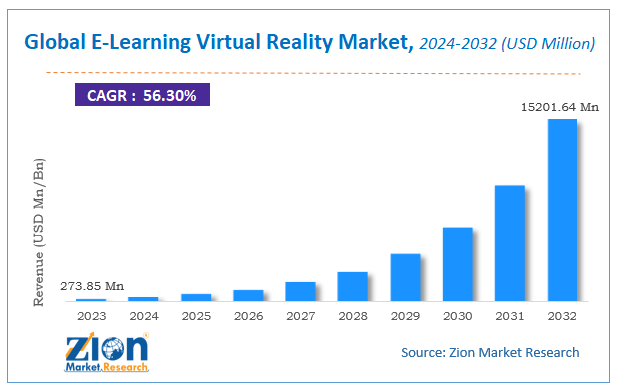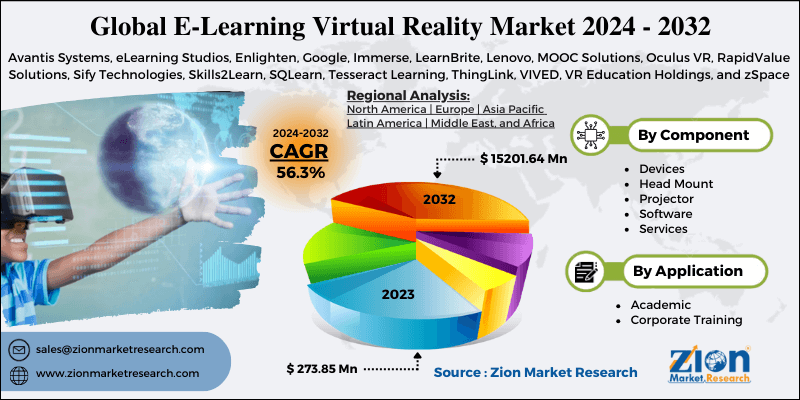E-Learning Virtual Reality Market Size, Share, Trends, Growth 2032

E-Learning Virtual Reality Market By Component (Devices, Software, and Services) and By Application (Academic and Corporate Training): Global Industry Perspective, Comprehensive Analysis, and Forecast, 2024-2032
| Market Size in 2023 | Market Forecast in 2032 | CAGR (in %) | Base Year |
|---|---|---|---|
| USD 273.85 Million | USD 15201.64 Million | 56.3% | 2023 |
E-Learning Virtual Reality Market Insights
According to Zion Market Research, the global E-Learning Virtual Reality Market was worth USD 273.85 Million in 2023. The market is forecast to reach USD 15201.64 Million by 2032, growing at a compound annual growth rate (CAGR) of 56.3% during the forecast period 2024-2032.
The report offers a comprehensive analysis of the market, highlighting the factors that will determine growth, potential challenges, and opportunities that could emerge in the E-Learning Virtual Reality Market industry over the next decade.
E-Learning Virtual Reality Market: Growth Drivers
E-learning is rapidly growing with its easy accessibility with virtual reality (VR) as a learning and development technology. E-learning studios are creating more effective and innovative VR training and simulations solutions/programs, which are used for both academic purposes and in various industries for conducting software and hardware programs.
Virtual reality in e-learning is beneficial in many ways. For instance, VR helps to block distractions, such as phones, TV ads, social networks, and other noises, enabling the learners to solely concentrate on their learning. This technique helps to submerge an interesting three-dimensional simulation consisting of various potent stimuli, which helps to naturally improve the brain’s ability to process and think new information leading to an unprecedented level of knowledge comprehension.
Furthermore, the personalized learning environment is one of the most important factors demanded by learners and trainers. Designers of e-learning virtual reality programs can create an environment that is comfortable for learners, enabling them to enjoy the realistic simulation of the environment. However, hefty investments for hardware may limit the e-learning virtual reality market globally to some extent. Though the use of VR in e-learning is not a new concept, the growing e-learning virtual reality market is yet to find its foothold globally.
In order to give the users of this report a comprehensive view of the e-learning virtual reality market, we have included a detailed competitive scenario and product portfolio of the key vendors. To understand the competitive landscape in the market, an analysis of Porter’s Five Forces Model for the market has also been included. The study encompasses a market attractiveness analysis, wherein all the segments are benchmarked based on their market size, growth rate, and general attractiveness.
E-Learning Virtual Reality Market: Segmentation
The global e-learning virtual reality market is segmented based on component, application, and region.
On the basis of component, the global e-learning virtual reality market includes devices, software, and services. The devices segment is further classified into head mount and projector. Head-mounted devices are observed to hold the largest market share in the years ahead. Virtual reality implementations use high-quality and high-speed 3-D graphics and audio coupling hardware, such as head-mounted displays and wired clothing to achieve believability and realism. To immerse into an authentic virtual reality experience, a special head-mounted display or VR headset is essential.
The application segment of this market includes academic and corporate training. The corporate training segment is expected to register the highest CAGR in the upcoming years. An increasing number of businesses are shifting toward e-learning virtual reality for training their employees. VR is implemented in places or situations where it can be hazardous or risky. Moreover, insurance companies can benefit from e-learning virtual reality by accurately assessing property damages caused by hailstorms, tornados, or floods.
E-Learning Virtual Reality Market: Report Scope
| Report Attributes | Report Details |
|---|---|
| Report Name | E-Learning Virtual Reality Market |
| Market Size in 2023 | USD 273.85 Million |
| Market Forecast in 2032 | USD 15201.64 Million |
| Growth Rate | CAGR of 56.3% |
| Number of Pages | 270 |
| Key Companies Covered | Avantis Systems, eLearning Studios, Enlighten, Google, Immerse, LearnBrite, Lenovo, MOOC Solutions, Oculus VR, RapidValue Solutions, Sify Technologies, Skills2Learn, SQLearn, Tesseract Learning, ThingLink, VIVED, VR Education Holdings, and zSpace |
| Segments Covered | By component, By application and By Region |
| Regions Covered | North America, Europe, Asia Pacific (APAC), Latin America, Middle East, and Africa (MEA) |
| Base Year | 2023 |
| Historical Year | 2018 to 2022 |
| Forecast Year | 2024 - 2032 |
| Customization Scope | Avail customized purchase options to meet your exact research needs. Request For Customization |
E-Learning Virtual Reality Market: Regional Analysis
The regional segment includes the current and forecast demand for North America, Europe, Asia Pacific, Latin America, and the Middle East and Africa with its further classification into major countries like the U.S., Canada, Mexico, UK, France, Germany, Italy, Spain, China, Japan, India, Australia, South Korea, Brazil, Argentina, the UAE, Saudi Arabia, and South Africa.
The regional segment of the global e-learning virtual reality market includes North America, Europe, Latin America, Asia Pacific, and the Middle East and Africa. North America is projected to hold the largest share of the e-Learning virtual reality market globally in the years ahead, owing to the presence of leading market players across the region.
E-Learning Virtual Reality Market: Competitive Analysis
The global e-learning virtual reality market is led by players like:
- Avantis Systems
- eLearning Studios
- Enlighten
- Immerse
- LearnBrite
- Lenovo
- MOOC Solutions
- Oculus VR
- RapidValue Solutions
- Sify Technologies
- Skills2Learn
- SQLearn
- Tesseract Learning
- ThingLink
- VIVED
- VR Education Holdings
- zSpace
This report segments the global e-learning virtual reality market into:
Global E-Learning Virtual Reality Market: Component Analysis
- Devices
- Head Mount
- Projector
- Software
- Services
Global E-Learning Virtual Reality Market: Application Analysis
- Academic
- Corporate Training
Global E-Learning Virtual Reality Market: Regional Analysis
- North America
- The U.S.
- Europe
- UK
- France
- Germany
- Asia Pacific
- China
- Japan
- India
- Latin America
- Brazil
- Middle East and Africa
Table Of Content
Methodology
FrequentlyAsked Questions
E-learning virtual reality (VR) is the term used to describe the integration of virtual reality technology into educational and training environments to generate interactive and immersive learning experiences. VR in e-learning enables students to interact with educational content in a simulated, three-dimensional environment, thereby improving the learning process through immersive and experiential methods.
The quality and accessibility of e-learning experiences are improved by advancements in VR hardware (e.g., headsets, controllers) and software (e.g., more realistic simulations, better imagery). In disciplines that necessitate complex visualisations or hands-on experience, there is a growing preference for interactive and immersive learning methods that VR can offer.
According to Zion Market Research, the global E-Learning Virtual Reality Market was worth USD 273.85 Million in 2023. The market is forecast to reach USD 15201.64 Million by 2032.
According to Zion Market Research, the global E-Learning Virtual Reality Market a compound annual growth rate (CAGR) of 56.3% during the forecast period 2024-2032.
The regional segment includes the current and forecast demand for North America, Europe, Asia Pacific, Latin America, and the Middle East and Africa with its further classification into major countries like the U.S., Canada, Mexico, UK, France, Germany, Italy, Spain, China, Japan, India, Australia, South Korea, Brazil, Argentina, the UAE, Saudi Arabia, and South Africa.
Some key participants operating in the global e-learning virtual reality market are Avantis Systems, eLearning Studios, Enlighten, Google, Immerse, LearnBrite, Lenovo, MOOC Solutions, Oculus VR, RapidValue Solutions, Sify Technologies, Skills2Learn, SQLearn, Tesseract Learning, ThingLink, VIVED, VR Education Holdings, and zSpace.
RelatedNews
HappyClients
Zion Market Research
Tel: +1 (302) 444-0166
USA/Canada Toll Free No.+1 (855) 465-4651
3rd Floor,
Mrunal Paradise, Opp Maharaja Hotel,
Pimple Gurav, Pune 411061,
Maharashtra, India
Phone No +91 7768 006 007, +91 7768 006 008
US OFFICE NO +1 (302) 444-0166
US/CAN TOLL FREE +1 (855) 465-4651
Email: sales@zionmarketresearch.com
We have secured system to process your transaction.
Our support available to help you 24 hours a day, five days a week.
Monday - Friday: 9AM - 6PM
Saturday - Sunday: Closed







